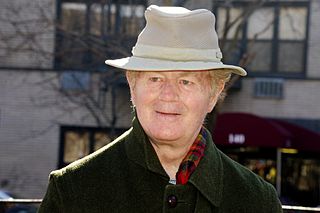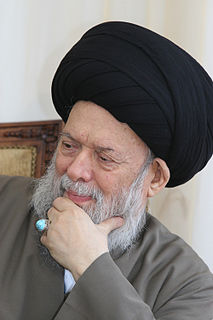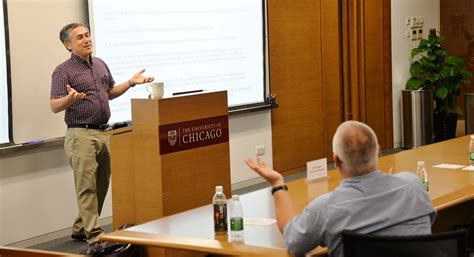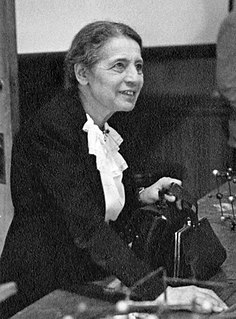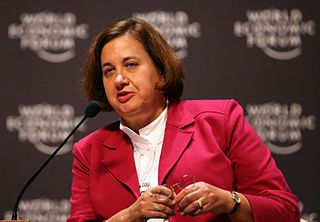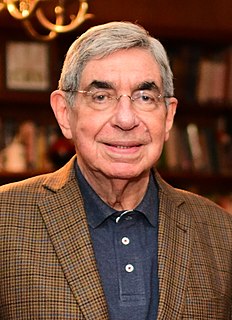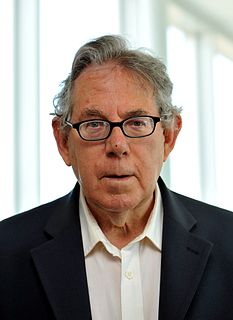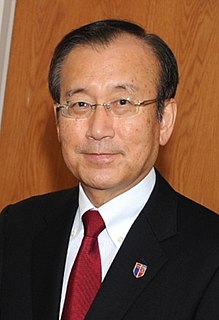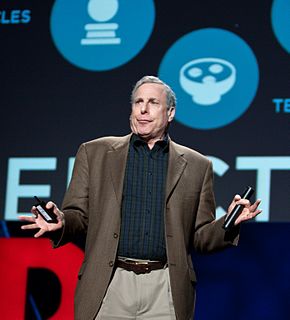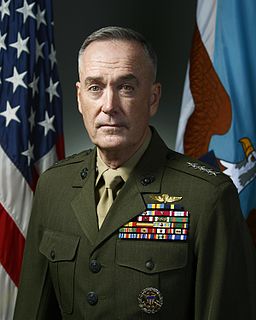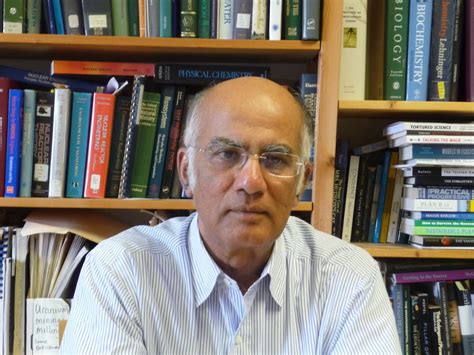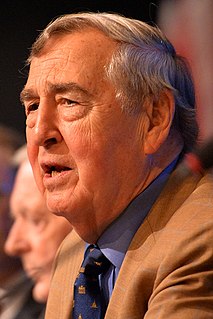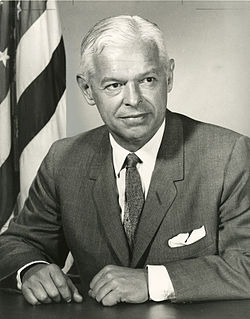Top 1200 Nuclear Deterrence Quotes & Sayings - Page 8
Explore popular Nuclear Deterrence quotes.
Last updated on December 24, 2024.
Terrorists do not actually need nuclear weapons. They have been conveniently supplied with 103 nuclear power plants scattered throughout the United States (438 of these deadly facilities exist throughout the world). A planned meltdown at one of these facilities would make the World Trade Center attacks seem like child's play. The massive concrete containers protecting the reactors are not strong enough to withstand the impact of a jumbo jet.
Physicists only talk to physicists, economists to economists-worse still, nuclear physicists only talk to nuclear physicists and econometricians to econometricians. One wonders sometimes if science will not grind to a stop in an assemblage of walled-in hermits, each mumbling to himself words in a private language that only he can understand.
My reading of the threat from Iran is that if Iran acquires nuclear weapons, it is an existential threat to the State of Israel and to other countries in the region because the other countries in the region will feel compelling requirement to acquire nuclear weapons as well. Now we cannot a second Holocaust.
[A] new generation, innocent of the divisions of the Cold War, this coming-of-age. ... If its members do not feel the urgency to escape the nuclear danger that some of its parents felt, neither has it developed the deep attachment to nuclear arms also often found among their parents, including most of the governing class. ... The call for abolition should therefore be, among other things, a call from an older generation to younger one.
Peace is not just the absence of war and conflict; it goes well beyond that. Peace must be fostered within the individual, within the family and within society. Simply transferring the world's nuclear weapons to a museum will not in itself bring about world peace. The nuclear weapons of the mind must first be eliminated.
I'm an adult and I know what power means in the modern world. In the modern world, power is mainly defined by such factors as the economy, defence and cultural influence. I believe that in terms of defence, Russia is without any doubt one of the leaders because we are a nuclear power and our nuclear weapons are perhaps the best in the world.
All American and Israeli goods and products should be boycotted in a way that undermines American and Israeli interests so as to act as deterrence to their war against Muslims and Islam that is being waged under the pretence of fighting terrorism. This boycott should become an overwhelming trend that makes these two states feel that their economies are in a real and actual danger.
It has been known for some time that a major nuclear war might lead to nuclear winter that would destroy the attacker as well as the target. And threats are now mounting, particularly at the Russian border, confirming the prediction of George Kennan and other prominent figures that NATO expansion, particularly the way it was undertaken, would prove to be a "tragic mistake," a "policy error of historic proportions."
The Europeans are starting to show that they're finally serious about the Iranian nuclear program, and they appear to be willing to use sticks against Iran. So I think it is imperative that the United States sit down with the Europeans and say, "Let's make this very clear to the Iranians. Either they can give up their nuclear program and their support for terrorism, in which case we'll given them all kinds of benefits. Otherwise, we'll join in comprehensive, multilateral sanctions that will cripple their very fragile economy."
Obviously, the US does not want a shooting war with North Korea. But there has to be some path out of this situation that is also presented that is peaceful. We have sanctions, we have deterrence, but the third leg of any resolution to this problem has to be dialogue. It seems prudent for the US to not only threaten North Korea, but to also offer a way forward.
Remember that in any major nuclear war, the first strike destroys the country that attacks; it's been known for years. The first strike of a major power is very likely to cause what's called nuclear winter, leads to global famine for years and everything's basically gone. Some survivors straggling around. Could [Donald Trump] do it? Who knows.
The Iranians know that if they develop nuclear weapons, they will be in tremendous jeopardy from military capabilities of their neighbors and of the United States. I am not predicting what will happen in 2013, but I do think it is a crucial year. I hope we can make it clear to the Iranians that we do not object to them having peaceful use of nuclear power. But when they enrich Uranium to a 20 percent level, people think they are going for the bomb. Their uranium enrichment program is a real danger.
The problem with deterrence - apparently sometimes forgotten by our former presidents - is that it is not static, but a creature of the moment, captive to impression, and nursed on action, not talk. It must be maintained hourly and can erode or be lost with a single act of failed nerve, despite all the braggadocio of threatened measures. And, once gone, the remedies needed for its restoration are always more expensive, deadly - and controversial - than would have been its simple maintenance.
Letting the perfect be the enemy of the good is one of the reasons we have a coal-dependent infrastructure, with the resulting environmental impact that all of us can see. I suspect environmentalists, through their opposition of nuclear power, have caused more coal plants to be built than anybody. And those coal plants have emitted more radioactive material from the coal than any nuclear accident would have.
In the near future, despite the development of alternative energy, when you look at the economics and environmental standards, then there's no other source of primary energy in the world than natural gas. Well, perhaps there is nuclear energy but there are also a lot of issues there and there are opponents of nuclear energy. Gas doesn't have those opponents. But there is a country that is, obviously, the world leader in gas reserves. That's our country, the Russian Federation.
Iran has been calling for it for years, and the Arab countries support it. Everyone except the United States and Israel support it. The U.S. won't allow it because it means inspecting Israel's nuclear weapons. The U.S. has continued to block it, and in fact blocked it again just a couple of days ago; it just wasn't widely reported. Iran's nuclear program, as U.S. intelligence points out, is deterrent, and the bottom line is that the U.S. and Israel don't want Iran to have a deterrent.
Donald Trump believes that the world will be safer if more nations have nuclear weapons. He's said Saudi Arabia should get them, Japan should get them, Korea should get them. And when he was confronted with this and told, wait a minute, terrorists could get those, proliferation could lead to nuclear war, here's what Donald Trump said, and I quote, go ahead, folks, enjoy yourselves.
The message that we must send to North Korea is twofold: If the North Korean regime believes that it can defend and protect itself through nuclear and missile programs, that is a misjudgment. But if North Korea gives up its nuclear program, we will help it secure and develop itself. We must consistently send these two messages.
American envoys came to see me before the crisis in Iraq and asked me to say that there were nuclear weapons in Iraq. I refused. They even told me that things would go well for Belarus in terms of investments, etc. All I had to do was to support them. I told them that I couldn't do it because I knew that there were no nuclear weapons there.
O. Hahn and F. Strassmann have discovered a new type of nuclear reaction, the splitting into two smaller nuclei of the nuclei of uranium and thorium under neutron bombardment. Thus they demonstrated the production of nuclei of barium, lanthanum, strontium, yttrium, and, more recently, of xenon and caesium. It can be shown by simple considerations that this type of nuclear reaction may be described in an essentially classical way like the fission of a liquid drop, and that the fission products must fly apart with kinetic energies of the order of hundred million electron-volts each.
I happen to be a scientist. My background is in nuclear physics. I was a nuclear engineer. But I don't see any incompatibility at all with my religious faith and God the creator of everything and the incompatibility between when the earth was created as specified in the Bible. I don't see any incompatibility there because those that were interpreting God's overall message didn't know anything about modern-day science.
Living with a nuclear North Korea could give its leaders the confidence to act more aggressively versus South Korea. It could also, over time, drive both South Korea and Japan, as well as countries farther afield such as Vietnam, to reconsider their non-nuclear postures. The stability of a critical region of the world would suddenly be in doubt.
We welcome the Obama administration's policy called the 'pivot to Asia' because it is a contributing factor to the safety and peace of the region. I think this pivot policy is playing an indispensable role in enhancing the deterrence of the U.S.-Japan alliance as well as ensuring peace and security in the Asia-Pacific region.
The existence of nuclear weapons presents a clear and present danger to life on Earth. Nuclear arms cannot bolster the security of any nation because they represent a threat to the security of the human race. These incredibly destructive weapons are an affront to our common humanity, and the tens of billions of dollars that are dedicated to their development and maintenance should be used instead to alleviate human need and suffering
I'm not against international institutions that would try to tackle global warming. But the way to go, at least in the short run, is to go to nuclear power. It's amazing to me that people who are so alarmed about global warming are so reluctant to adopt the obvious short-term solution - the bridge until the day when we have affordable renewable energy - of nuclear power.
Donald Trump believes that the world will be safer if more nations have nuclear weapons. And he's said Saudi Arabia should get them, Japan should get them, Korea should get them. And when he was confronted with this, and told, wait a minute, terrorists could get those, proliferation could lead to nuclear war, here's what Donald Trump said, and I quote: "Go ahead, folks, enjoy yourselves."
Nuclear man is the man who realizes that his creative powers hold the potential for self-destruction. He sees that in this nuclear age vast new industrial complexes enable man to produce in one hour that which he labored over for years in the past, but he also realizes that these same industries have disturbed the ecological balance and, through air and noise pollution, have contaminated his own milieu.
Both the President and Mr Gorbachev have said that they want to see a world without nuclear weapons. I cannot see a world without nuclear weapons. Let me be practical about it. The knowledge is there to make them. So do not go too hard for that pie in the sky because, while everyone would like to see it, I do not believe it is going to come about.
Without a deal [with Iran], the international sanctions regime will unravel with little ability to reimpose them. With this deal, we have the possibility of peacefully resolving a major threat to regional and international security. Without a deal, we risk even more war in the Middle East and other countries in the region would feel compelled to pursue their own nuclear programs, threatening a nuclear arms race in the most volatile region in the world.
Russia is modernizing its nuclear systems. They're moving toward more effective tactical nuclear systems. They're moving toward delivery systems designed to evade anti-ballistic missile defenses. The Russians are investing, by the way, in robotic weapons, including a potential robotic tank. Their investment in new technology, I suspect, outweighs all of the European defense research and development spending combined.
The invasion of Iraq will surely go down in history as one of the most cowardly wars ever fought. It was a war in which a band of rich nations, armed with enough nuclear weapons to destroy the world several times over, rounded on a poor nation, falsely accused it of having nuclear weapons, used the United Nations to force it to disarm, then invaded it, occupied it, and are now in the process of selling it.
In discussing the state of the atmosphere following a nuclear exchange, we point especially to the effects of the many fires that would be ignited by the thousands of nuclear explosions in cities, forests, agricultural fields, and oil and gas fields. As a result of these fires, the loading of the atmosphere with strongly light absorbing particles in the submicron size range (1 micron = 10-6 m) would increase so much that at noon solar radiation at the ground would be reduced by at least a factor of two and possibly a factor of greater than one hundred.
I want to say, and this is very important: at the end we lucked out. It was luck that prevented nuclear war. We came that close to nuclear war at the end. Rational individuals: Kennedy was rational; Khrushchev was rational; Castro was rational. Rational individuals came that close to total destruction of their societies. And that danger exists today.
In some ways more painful is the fact that their experience appears to be fading from the collective memory of humankind. Having never experienced an atomic bombing, the vast majority around the world can only vaguely imagine such horror, and these days, John Hersey's Hiroshima and Jonathan Schell's The Fate of the Earth are all but forgotten. As predicted by the saying, 'Those who cannot remember the past are condemned to repeat it,' the probability that nuclear weapons will be used and the danger of nuclear war are increasing.
If you want to find weapons of destruction, you can find them all over the place. Take, say, Israel. There is a very great concern right now about proliferation of nuclear weapons, as there should be. Israel has a couple of hundred nuclear weapons and also chemical and biological weapons. This stockpile is not only a threat in itself but encourages others to proliferate in reaction and in self-defense. Is anybody saying anything about this?
This is a good deal for the United States, north Korea will freeze and then dismantle its nuclear program. South Korea and our other allies will be better protected. The entire world will be safer as we slow the spread of nuclear weapons. The United States and international inspectors will carefully monitor North Korea to make sure it keeps its commitments. ...Only as it does, so will North Korea fully join the community of nations.
It is such a supreme folly to believe that nuclear weapons are deadly only if they're used. The fact that they exist at all, their presence in our lives, will wreak more havoc than we can begin to fathom. Nuclear weapons pervade our thinking. Control our behavior. Administer our societies. Inform our dreams. They bury themselves like meat hooks deep in the base of our brains. They are purveyors of madness. They are the ultimate colonizer. Whiter than any white man that ever lived. The very heart of whiteness.
I want to reassert again the position of the United States that with regards to Iran, we will not allow Iran to develop a nuclear weapon, period. We will not allow them to develop a nuclear weapon, and we will exert all options in the effort to ensure that that does not happen...The United States stands firmly with Israel, and we have a rock solid commitment to the security of Israel and to the security of its citizens.
It is not unimaginable to have military options to respond to North Korean nuclear capability. What's unimaginable to me is allowing a capability that would allow a nuclear weapon to land in Denver, Colorado. That's unimaginable to me. So my job will be to develop military options to make sure that doesn't happen.
Maybe that will happen with other countries as well. And so, that's why one of the things that groups like mine that work for the elimination of nuclear weapons and work for their marginalization in the meantime, we say you have to diminish the political value that's attached to nuclear weapons in order to give them less (kind of) desirability in the eyes of governments that do not now have them, and thus to help stop their spread.
Nuclear power as a solution to global warming is theoretically possible, but the proliferation problems and accident risks it would create would, I think, be intolerable because you have to build an immense number of nuclear power plants, one large plant a week around the world for the next 40 years, to make a significant dent in the global warming problem.
The scientists who made the atomic bomb are, in my sense, people with a tragic destiny. You know, there was the US race with Nazi Germany and good evidence that the Germans were more advanced in nuclear physics, and we had to get the bomb first. But then there was the use of that dreadful weapon, or instrument of genocide, and many of the more sensitive scientists turned quickly into anti - nuclear people - and very effective ones.
The real concern is that Iran would do what Pakistan did. Pakistan wanted nuclear weapons, like Iran, purely for defensive reasons - to defend itself against India. The problem was that once Pakistan acquired the weapons, it allowed the country to be more aggressive. So they stepped up their support for the Kashmiri terrorists, and it led very quickly to the Kargil crisis in 2000, which almost sparked a nuclear war between India and Pakistan.
In the mid-1980s, operating problems took [nuclear] plants off-line so often that, on an annual basis, they operated at only about 55 percent of their rated total generating capacity. Today, as a result of several decades of experience and an intense focus on performance ... nuclear plants in the United States operate at over 90 percent of capacity. That improvement in operating efficiently is so significant in its impact that it can almost be seen as a new source in electric power itself.
The emergent terrorist threats and the spread of nuclear technology and materials have made it much more likely that terrorists will get their hands on a nuclear weapon and that just changes the whole calculus. I love the quote by Rev. Richard Cizik: "If you've never changed your mind about anything, then pinch yourself, you might be dead." The world has changed and we need to start talking about this.
The intelligence services would probably be in a better position to make an assessment of the advancement of the Iranian nuclear program than Podhoretz or Ledeen. They don't have access to any specific information. So for them to dismiss it has no great value because they have no authority whatsoever on this issue. For them to push forward with their efforts to get a war started between the U.S. and Iran, you certainly cannot say that Iran does not have a nuclear program. If you say that, then the justification for war has basically been eliminated.
The final and best means of strengthening demand among consumers and business is to reduce the burden on private income and the deterrence to private initiative which are imposed by our present tax system, and this administration pledged itself last summer to an across-the-board, top-to-bottom cut in personal and corporate income taxes to be enacted and become effective in 1963.
I think we should be organized in something called an Alliance Against Nuclear Terrorism. In the same way that NATO was the great alliance of the Cold War and served a great purpose then, we need now, in the war on terrorism, a new alliance, the mission of which would be to minimize the risk of nuclear terrorist attacks, and the members would agree to sign on to the gold standard.
I think it is less the limited amount of information than the filters that information about the Middle East must pass through before being fairly addressed in the mainstream media. In more intellectual and geopolitical terms, the perceptions of the region are distorted by a combination of Orientalism and the priorities of the state of Israel, including the refusal to discuss the relevance of Israel's nuclear weapons arsenal in the context of addressing Iran on its nuclear program.
Astronomy is so easy to love. ... Fairly or not, physics is associated with nuclear bombs and nuclear waste, chemistry with pesticides, biology with Frankenfood and designer-gene superbabies. But astronomers are like responsible ecotourists, squinting at the scenery through high-quality optical devices, taking nothing but images that may be computer-enhanced for public distribution, leaving nothing but a few Land Rover footprints on faraway Martian soil, and OK, OK, maybe the Land Rover, too.
When nuclear weapons were an elite club of five relatively sane world powers, the Left was convinced the planet was about to go ka-boom any minute, and the handful of us who survived would be walking in a nuclear winter wonderland. Now anyone with a few thousand bucks and an unlisted number in Islamabad in his Rolodex can get a nuke, and the Left couldn't care less.
The fact is, I see no compelling reason why we should not unilaterally get rid of our nuclear weapons. To maintain them is costly and adds nothing to our security. I can think of no circumstances under which it would be wise for the United States to use nuclear weapons, even in retaliation for their prior use against us. What, for example, would our targets be? It is impossible to conceive of a target that could be hit without large-scale destruction of many innocent people?
I know we need more nuclear power in order - nuclear power, after all, is not dependent on fossil fuels and emits no greenhouse gases. I believe we're going to be able to have coal-fired plants that have zero emissions. We need to work on carbon sequestration technologies. I mean, there's a lot we can do together and achieve the objective, which a lot of people want, which is the reduction of greenhouse gases, and at the same time, have viable economic growth.



